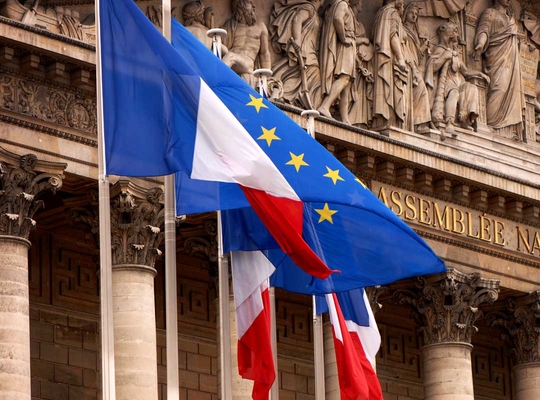You are here
Macron’s EU doesn’t fit Europe

It was a bold speech by French President Macron in the Sorbonne amphitheatre the day before yesterday, well-constructed and delivered with bravura. Maybe a tad too long though. It was a speech given with the eloquence only French politicians can muster. The content of the speech was also very “French”, and that’s the crux of the problem, as MEP Sander Loones points out.
It is admirable that Macron is putting his vision for the Europe of 2024 on the table, and that he isn’t hiding behind abbreviations and jargon understood only by the Eurocrats at Schuman Square in Brussels. By doing so, he is furthering an ancient tradition in which France attempts to set the European debate. It’s also striking that Macron is not letting himself be slowed down one iota by the German election result. With his speech he even seems to be muscling in - wittingly or unwittingly - on the coalition talks in Berlin.
“A sovereign, democratic and unified Europe”, is how Macron sees it, with a much bigger budget, harmonised corporate tax, a unified social policy, and a unified asylum policy. A European industrial policy, a European Minister for Finance, the relaunch of the European Financial Transaction Tax, new European environmental taxes, a European public prosecutor, European universities, much more European solidarity, and the list goes on...
A sovereign Europe?
Seeing the wood for the trees is the first challenge. What Macron proposes is revolutionary: no longer are the Member States sovereign, let alone the people. “Europe” is. His reasoning: to be able to face up to the USA and China, the EU must become a strong economic and industrial power, which he believes is only possible by shifting all these new powers to Europe. And the Member States? They become the de facto provinces of that unified block.
Well, this Macron vision of the EU doesn’t fit Europe. There is no support among the population for further centralisation. There is no enthusiasm for being governed by a far-off bureaucracy. People themselves want to be able to choose who comes to live in their country, which economic policy is pursued, how they guarantee their Social security Social security is currently managed at the Federal level in Belgium. The most important pillars of Belgian social security are: sickness and invalidity insurance (NIDHI), pensions, unemployment insurance and child allowances. In addition, occupational illness, occupational accidents and annual holidays are dealt with at this level. Some Flemish parties have been campaigning for years for (large parts of) social security to be transferred to the Regions and Communities. social security . And they certainly won’t entertain the thought of paying a ton of taxes for citizens from other countries.
Required: tailor-made policy
Macron’s claim that a top-down centralised Europe would produce an economic global player also doesn’t ring true. While a politically unified Europe would indeed conjure up the illusion of economies of scale, in practice it often results in large-scale squandering. Outlining the same economic policy from Brussels for Malta and Ireland, for Slovenia and Flanders, is absurd. What is needed is tailor-made policy for all those very different local economies, and that’s not something you get by regulating, harmonising and coordinating everything at EU level.
An industrial policy at European level is also a typical French request. When Macron advocated a more innovative Europe in his speech, he proposed creating a European Innovation Agency. However, innovation comes from the bottom up: often from small businesses, start-ups and scale-ups. From universities. Not from the top down, not from bureaucrats.
Macron also wants a much bigger budget for the union. A eurozone budget with its own parliament with the “sovereignty” to levy new European taxes, taxes that will mostly be paid in the North and spent in the South. A Union in which money never stops flowing from North to South: like in Belgium. It’s the cause of great political frustration and not much in the way of economic results.
Shielding France
So are these proposals good for Europe? No, they are first and foremost good for France, with Brussels as an extension of Paris. That’s always been the mindset in the French presidential palace. The French want to make Europe into a dam that protects Europe against the rest of the world. But it’s primarily France that the dam protects. Or more accurately, it shields France. The French don’t like the free market, don’t like trading. The French look to l’Etat. They want the EU to reinstate their vanishing political grip on the economy. The French want a government to be a dirigeant, not a service provider.
The alternative is clear. The EU must not become a state. We will not become stronger by all doing the same things, but we will by playing to the strengths of each Member State. The Union must therefore only intervene where absolutely necessary, with regard to security and the closure of borders for example. At the same time, the EU must become more flexible in many areas and give the Member States more freedom. It’s precisely decentralisation and political diversity that form the strength of Europe. Competition between cities, regions and countries is pushing us onward. Let there be differences. No “ever closer union” in every domain. Cooperation, yes. Total unification, no.
Only in this way will we obtain a European Union that serves all Member States, including the smaller Member States, and not solely the heavyweights in the form of France and Germany. And which serves all European citizens, not just the Southern Europeans. It’s clear that Macron’s Union fits the French. It just doesn’t fit Europe.

